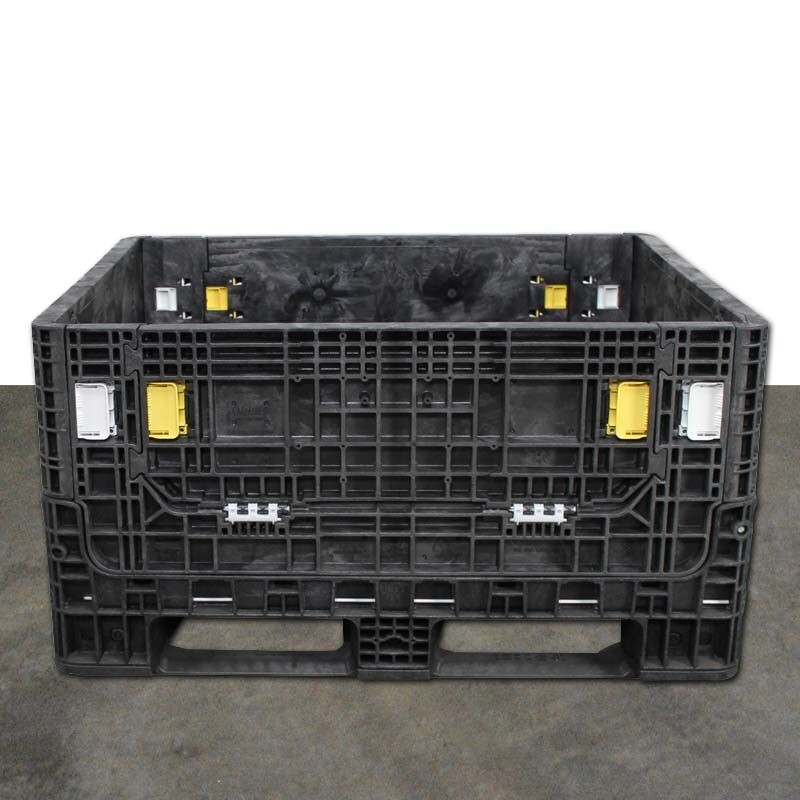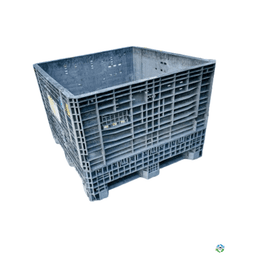Why Bulk Containers Are Crucial for Cost-Effective and lasting Transport
Mass containers play an essential function in modern-day logistics. They promote the effective activity of huge quantities of products, thus optimizing transport procedures. This approach not only reduces costs but additionally minimizes environmental impact with reduced discharges and waste generation. As markets seek more lasting techniques, the fostering of bulk containers is becoming increasingly considerable. What ramifications does this shift hold for future logistics and supply chain management?

The Benefits of Utilizing Mass Containers in Logistics
Bulk containers transform logistics by enhancing performance and sustainability. These containers permit the transport of huge amounts of products in a solitary journey, considerably minimizing the number of journeys required. This not only streamlines procedures yet likewise lessens labor prices linked with handling, packing, and dumping. Furthermore, mass containers are made to enhance space utilization within transport lorries, ensuring that even more products can be shipped concurrently.
The standardization of bulk containers also simplifies the logistics procedure. With consistent measurements, they can be quickly piled and kept, bring about boosted warehouse monitoring. Bulk containers typically include durable products that secure materials from damages during transit, therefore reducing item loss and increasing overall dependability. Therefore, companies can experience enhanced supply chain efficiency, ultimately resulting in increased productivity and consumer contentment. This combination of variables makes bulk containers a vital property in modern-day logistics.
Ecological Impact: Reducing Waste and Carbon Footprint
As markets significantly focus on sustainability, the fostering of mass containers has actually arised as a crucial strategy for decreasing waste and lowering carbon impacts. These containers lessen using product packaging materials, such as boxes and plastic, consequently notably decreasing total waste generation. By combining shipments, mass containers improve transportation performance, permitting even more products to be delivered per journey. This decrease in journeys directly associates with reduced greenhouse gas discharges, contributing to a smaller carbon footprint.
Furthermore, bulk containers can frequently be recycled or reused, additionally mitigating ecological effect. The longevity of these containers warranties they can hold up against numerous transportation cycles, lowering the need for single-use alternatives. used collapsible containers. By simplifying logistics and advertising reliable resource use, bulk containers not only support sustainable techniques but additionally motivate sectors to line up with worldwide ecological goals. Eventually, their application reflects a commitment to environmental stewardship and liable source management
Expense Savings: Just How Mass Containers Lower Transport Costs
While many companies look for ways to enhance their profits, making use of mass containers provides a significant chance for lowering transportation expenses. Mass containers maximize the quantity of products carried, enabling businesses to ship bigger amounts simultaneously. This efficiency minimizes the variety of journeys required, directly lowering gas prices and decreasing labor expenses related to loading and unloading.
In addition, bulk containers often feature streamlined layouts that enhance space usage within transportation automobiles. This implies less voids, causing extra efficient use of offered capacity. The sturdiness of mass containers can decrease the risk of product damage throughout transportation, minimizing losses and making certain that more items arrive undamaged.
Enhancing Supply Chain Performance With Mass Storage Space Solutions
Mass storage space remedies play an essential function in improving supply chain efficiency by optimizing inventory management. By combining items into fewer, larger containers, organizations can greatly reduce dealing with costs related to regular transfers and processing. This structured method permits for far better tracking and monitoring of supply, eventually resulting in enhanced functional performance.
Streamlined Supply Administration
Effective stock monitoring is crucial for maximizing supply chain operations, specifically when organizations take on bulk storage solutions. These solutions enable businesses to preserve greater stock levels while minimizing the regularity of replenishment. By consolidating products into bulk containers, business can improve their stock processes, reducing the intricacy connected with tracking several smaller packages. This method helps with precise inventory matters and boosts projecting precision, permitting even more enlightened decision-making. Furthermore, mass storage services streamline stockroom company, making it simpler to find and gain access to products when needed. As an outcome, organizations can attain an extra effective supply turn over rate, ultimately enhancing general supply chain efficiency and decreasing the probability of stockouts or overstock scenarios.

Minimized Handling Prices
The application of bulk storage services not just improves inventory management however likewise considerably reduces managing expenses throughout the supply chain. By combining materials into mass containers, firms lessen the need for regular handling and transfer between different storage space and transport systems. This strategy cuts down on labor prices related to loading, dumping, and moving smaller sized packages. In addition, mass storage space lowers the regularity of deliveries, bring about lower transport costs and decreased gas consumption. Because of this, businesses can optimize their logistics procedures, enabling a more effective allowance of resources. Inevitably, lowered taking care of prices add to boosted total supply chain efficiency, cultivating an atmosphere that supports both sustainability and economic feasibility.

Versatility of Mass Containers Across Various Industries
Many sectors have unique requirements for transport and storage, bulk containers have arised as a flexible remedy that satisfies a vast variety of requirements. These containers, varying from big bins to specialized tanks, can accommodate varied materials, consisting of powders, liquids, and granules. In the agricultural market, mass containers promote the transport of grains and fertilizers, while the food and beverage industry uses them for components and ended up products. The chemical industry counts on mass containers for securely transferring hazardous products, making sure compliance with safety regulations. Additionally, building firms gain from mass containers for delivering accumulations and other products. Their versatility prolongs to numerous modes of transport, consisting of ships, vehicles, and trains, boosting logistical performance. This adaptability not just improves operations throughout different sectors however additionally advertises sustainability by lowering product packaging waste and enhancing room in transportation. Mass containers play an important function in contemporary supply chain monitoring.
Future Trends in Bulk Container Usage and Sustainability
The future of bulk container usage is progressively shaped by innovative materials development that boosts sustainability. Furthermore, automation in logistics promises to enhance procedures, reducing waste and boosting efficiency. Embracing circular economy practices will certainly further revolutionize exactly how bulk containers are designed, made use of, and reused, promoting an extra sustainable transport landscape.
Ingenious Products Advancement
As markets increasingly prioritize sustainability, ingenious materials growth in mass containers emerges as a substantial consider enhancing green transportation remedies. Manufacturers and researchers are checking out biodegradable plastics, recycled composites, and light-weight metals to lower ecological impact. These products not just lessen waste however likewise boost fuel performance by decreasing the total weight of containers. Additionally, advancements in clever products, which can adjust to differing problems, improve the resilience and functionality of bulk containers. The combination of these ingenious materials lines up with round economic climate concepts, advertising reuse and recycling. As the demand for lasting practices expands, the growth of such materials will play an essential role in shaping the future of bulk container use in logistics and transportation.
Automation in Logistics
Significant innovations in automation are poised to change logistics and the application of bulk containers, improving sustainability in transport. Automated systems, including drones and autonomous cars, are improving the movement of bulk containers, reducing the dependence on conventional fuel-powered transport. These technologies enhance directing and packing processes, reducing empty miles and enhancing gas effectiveness. Furthermore, automated inventory monitoring systems improve tracking and surveillance of mass containers, making certain much better source appropriation and decreased waste. The integration of the Net of Points (IoT) allows real-time information analysis, enabling aggressive decision-making that lines up with sustainability objectives. As automation remains to progress, it is expected to drive better technologies in bulk container use, ultimately sustaining even more sustainable logistics practices and minimizing the ecological influence of transport.
Circular Economic Climate Practices
Advancements in automation are establishing the phase for a much more incorporated approach to round economy methods in the domain name of mass container use. As sectors significantly embrace sustainability, bulk containers are being developed for durability and reusability. This shift not only lessens waste yet likewise enhances source effectiveness. Business are adopting methods such as closed-loop systems, where made use of containers are gathered, refurbished, and reintroduced right into the supply chain. In addition, wise technologies track container life cycles, assisting in better monitoring and lowering environmental effect. The partnership between producers, logistics suppliers, and end-users is crucial in establishing requirements for lasting container usage. used collapsible containers. Future fads show a growing emphasis on products that are recyclable and biodegradable, additional reinforcing the round economic climate's principles in bulk transportation

Regularly Asked Inquiries
What Products Are Bulk Containers Usually Made From?
Bulk containers are generally built from resilient materials such as high-density polyethylene, steel, aluminum, and cardboard. These products offer defense, stamina, and versatility, making them appropriate for delivering numerous goods in different markets successfully.
How Do I Choose the Right Size Mass Container?
Picking the ideal dimension bulk container includes examining the quantity of products to be moved, considering dealing with equipment compatibility, and appraising storage area demands. Proper dimension warranties efficiency in transport and reduces waste throughout shipment.
Are Bulk Containers Reusable or Recyclable?
Mass containers are usually recyclable, created for multiple journeys, enhancing sustainability. Numerous can likewise be reused, depending on the products made use of. Picking recyclable alternatives further supports environmental goals and more info lowers waste in transportation techniques.
What Safety Rules Relate To Bulk Container Transport?
Safety regulations for bulk container transportation consist of conformity with the Division of Transportation standards, correct labeling of harmful materials, structural honesty analyses, and adherence to weight restrictions to assure risk-free handling and protect against crashes during transportation.
Exactly How Can Businesses Change to Using Mass Containers Efficiently?
Businesses can transform to bulk containers by assessing current logistics, educating personnel on handling, spending in appropriate devices, maximizing inventory administration, and working together with providers to guarantee compatibility and effectiveness throughout the supply chain.
As markets increasingly prioritize sustainability, the adoption of bulk containers has emerged as a vital approach for minimizing waste and lowering carbon impacts. By settling products right into mass containers, firms can improve their stock processes, decreasing the complexity associated with tracking numerous smaller plans. As sectors increasingly prioritize sustainability, innovative products growth in mass containers emerges as a considerable element in improving environment-friendly transport solutions. Automated systems, consisting of drones and autonomous cars, are simplifying the motion of bulk containers, reducing the reliance on typical fuel-powered transportation. Additionally, automated stock monitoring systems improve tracking and monitoring of mass containers, making certain far better source appropriation and lowered waste.